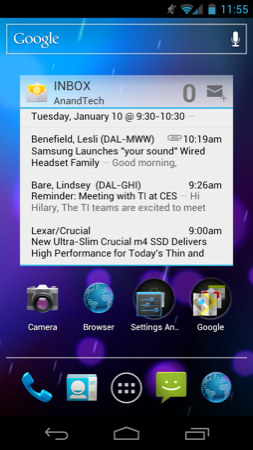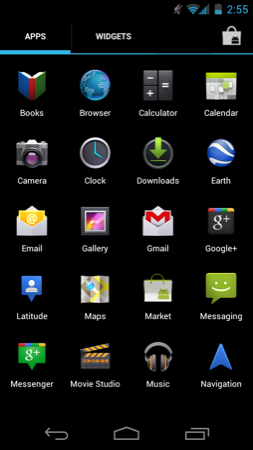Samsung Galaxy Nexus & Ice Cream Sandwich Review
by Brian Klug & Anand Lal Shimpi on January 18, 2012 1:34 PM ESTGoogle employs more than 20,000 people worldwide and the number of them working on Android are in the single digit percentage range. Google's business is search, but it has always had aspirations of more. Android isn't just a chance to capitalize on mobile search for Google, it's also an opportunity to grab power in the next era of personal computing. If you believe that smartphones will eventually replace mainstream PCs, who wouldn't want to be to smartphones what Microsoft was to PCs in the early 1990s?
Previous versions of Android have been cautious, evolutionary steps along a path to being a more open/flexible alternative to iOS. Starting with Honeycomb (Android 3.0) however, Google began to step out of the shadow of its competitors and really start to define Android as a mobile computing platform. Honeycomb was limited to tablets but its successor, Ice Cream Sandwich (Android 4.0), would bring unification to Android across both tablets and smartphones.
Today we look at both ICS and its launch vehicle, Google's Galaxy Nexus.
The Android vs. iOS Debate
It's very clear to me now more than ever that Apple and Google have completely different goals with their mobile OS strategies. Excluding the unclear strategy behind Chrome OS, Android is pretty much Google's primary operating system. The unified tablet/smartphone strategy behind Ice Cream Sandwich makes sense because for Google to succeed in the OS business it needs to deploy Android on everything from smartphones to notebooks. We've already seen the strengths in having a smartphone platform with a strong app ecosystem. Things become even more appealing if you have a phone, tablet and PC that all run the same OS and apps. As Android is Google's one-size-fits-all operating system, it needs to have a broader and slightly more ambitious focus than iOS otherwise it risks losing the race in the long run.
Apple is in a different position. It already has a successful desktop/notebook OS that is continuing to grow. While iOS has been a runaway success for Apple, the Mac OS X platform is a solid option for any user who needs more than their iPhone or iPad can provide. The two OSes may converge or at least borrow heavily from one another, but in the interim they can remain independent. If you need more of a computing experience Apple is happy to sell you a Mac. If you want the it-just-works appliance experience in your phone or tablet, Apple has a whole bunch of iPhone/iPad configurations to offer you.


ICS isn't a step towards iOS. If anything it proves that Google is committed to its own trajectory. Android is an OS that, although more closed than many would like, still allows more flexibility than iOS. You can sideload apps not purchased in the Market. The file system isn't completely hidden from you. You can even override the default zoom level on web pages. Apple and Google both pour tons of time and research into figuring out the best way to do something. And, to be honest, I feel like Apple generally does a better job of "getting it" for the very mainstream consumer. Rather than attempt to make the perfect mold however, Google gives you one that's a bit more flexible.
I've said this before but I do believe that Apple is trying to deliver more of an appliance experience, whereas Google is providing you with a modern take on a traditional computing experience. If the appliance is a smartphone, then both approaches are equally capable - it's just a matter of personal preference.
What's new in ICS really falls into one of three categories:
- Improvements in UI frame rate due to OpenGL ES rendering (non-skia) path
- UI tweaks
- New features
Nowhere in this list is a fundamental change in the way Android works. I feel that this is a very important point to understand and likely the cause for lots of disagreement when it comes to just how impressive (or not) ICS is.
ICS is smoother, more polished and has its own set of new features that make it a significant step forward for Android. What ICS is not however is an outright clone of iOS. If you prefer the iOS experience to Android, ICS will do nothing to change your opinion. If all you were missing from Android was a smoother UI, then its fourth major release should be almost everything you could ask for.










185 Comments
View All Comments
roedtogsvart - Wednesday, January 18, 2012 - link
Finally!prophet001 - Wednesday, January 18, 2012 - link
Just had one of this hit my desk today :D very nice phone.Owls - Thursday, January 19, 2012 - link
No offense but I'm kind of pissed after reading this article with what amounts to a masturbatory article about the iphone 4s.For example on an ipad 2 and iphone 4s there is plenty of lag here and there using the UI on par with gingerbread. On ICS? It's pratically nonexistent.
The camera? The only issue I found was that on Auto the shots didn't always come out great. Some manual adjustments fixed that and after comparing the shots to my dad's iphone 4s there's virtually no difference.
I pretty much stopped reading after the camera section.
michael2k - Thursday, January 19, 2012 - link
What kind of lag are you talking about? The A5 SoC is one of the most powerful out there and it's already been noted in several reviews how the older A4 SoC plus iOS 4 and 5 outperformed Gingerbread. You're saying the lag on ICS is somehow better than an A5 plus iOS 5 by saying the A5 + iOS 5 is as laggy as a CPU bound unaccelerated Android 2.3?medi01 - Friday, January 20, 2012 - link
Why, do you think, anand is using 720p "off-screen" in benchmarks, why not try it directly on screen?PS
Oh, and why "black levels" aren't present on screen comparison? And why iphones dissapear from charts where they are wtfpwned by other phones?
Sigh. Disgusting.
michael2k - Monday, January 23, 2012 - link
All the phones and tablets would go up in number if they used native resolution, but then you can't actually compare the HW because each would be constrained by different resolutions. By using 720p offscreen you get to judge all the HW on the same scale.Also, Anand has definitely reported black levels:
http://www.anandtech.com/Show/Index/4215?cPage=4&a...
I don't know of any places where the iPhone disappear so much as the iPhone doesn't run the app. You'll notice that the rankings appear congruent; 4S followed by S2 with the Nexus and 4 on the bottom. Nothing changes, except that certain apps aren't available for the iPhone. Rightware Basemark is an Android app, silly.
medi01 - Wednesday, January 25, 2012 - link
And "actual HW number" tells you what? That GPU X is faster than GPU Y? Instead of saying "phone X would render faster than phone Y"? How is first more appropriate mesurement than the latter?@Also, Anand has definitely reported black levels:@
Are you kidding me? Where is vs amoled comparison in your link? How is it related to the article in discussion?
Not only do they skip "black levels", they somehow manage to make a picture of AMOLED screen where BLACK looks GREY. Wow, great job misleading readers.
michael2k - Wednesday, January 25, 2012 - link
Yes, GPU X is faster than GPU Y is a perfectly valid comparison. You would have to ask Anand why he thought comparing GPUs was a valid benchmark, but given the long track record of how responsive the iPhone has been compared to Android, I don't see how that anything else is relevant. The fact that offscreen performance favors the iPhone 4S doesn't change that it doesn't favor the iPhone 4!Also, why would he compare to amoled when in fact there are no amoled tablets to compare to?
You're a baseless and pointless critic.
doobydoo - Thursday, January 19, 2012 - link
There is no lag at all on the iPad 2 or the iPhone 4S, what are you talking about?I think you're more pissed off that the Nexus came with an average camera and a 2-year-old GPU.
Lucian Armasu - Monday, January 30, 2012 - link
Well, iPhone 4 came with a 2 year old GPU, too in 2010, and much lower FPS than the competition, if you remember those GPU charts, where the iPhone 4 was the last at the bottom. Not too many people seemed to care about it.